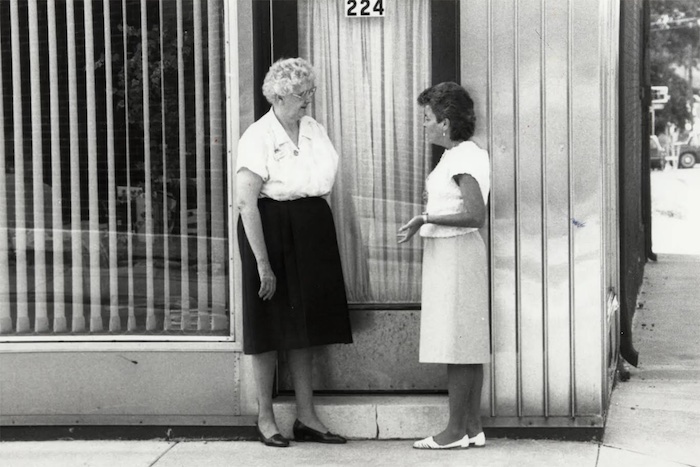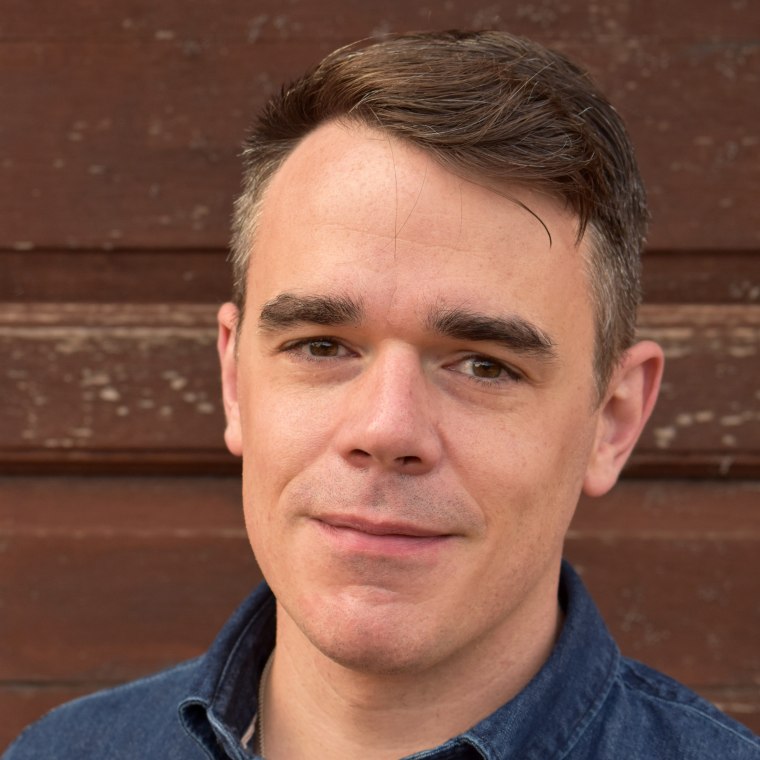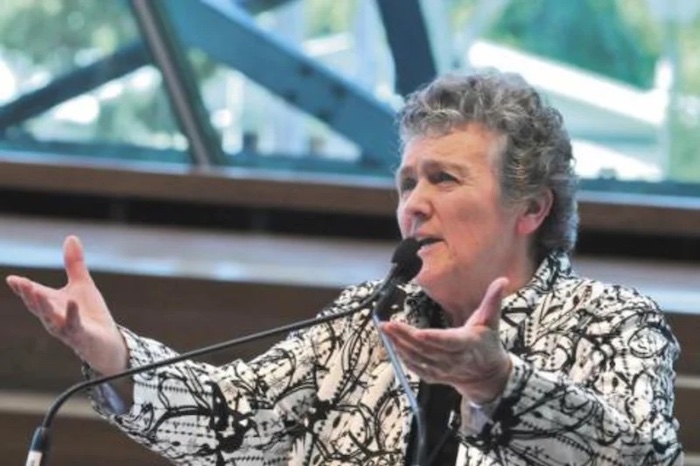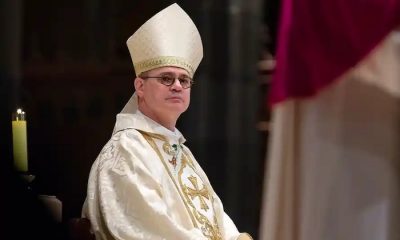Pope Francis thanked the book’s author for bearing witness to the stories of Catholics who offered support while others offered only condemnation.

By Jo Yurcaba
In 1986, the Vatican released a letter condemning homosexuality with what The New York Times called a “pointed allusion to AIDS.”
A year later, nearly 48,000 Americans had died from the disease.
Even as the death toll rose, the Roman Catholic Church reinforced its stance and also opposed the gay and lesbian rights movement more generally, creating an ongoing tension. Despite this, some nuns and priests went against those teachings and worked behind the scenes to care for and sit at the bedsides of people dying from AIDS-related illnesses.
A new book, “Hidden Mercy: AIDS, Catholics, and the Untold Stories of Compassion in the Face of Fear,” by Michael O’Loughlin, uncovers those stories.
O’Loughlin, a journalist who lives in Chicago, writes in the first chapter that for as long as he can remember, he’s been on a search. “I am gay and I am Catholic,” he wrote. “And I struggle continuously to reconcile those two parts of my identity.”

He wanted to speak with people who had lived through similar struggles, and in 2015 a friend who was a priest suggested that he speak to gay Catholics who lived through the height of the AIDS crisis in the United States. He ran with the idea and began tracking down scientists and doctors involved in AIDS work — nuns and priests who served as caretakers to the ill, and activists, including those from the AIDS Coalition to Unleash Power, or ACT UP.
He said he chose to focus on stories of compassion because he is interested in “people who had a lot to lose by taking on the power structure of the church but still did the right thing.”
“So, the priests who minister to gay men dying from AIDS, some of whom come out as gay themselves, and challenge the churches to be more welcoming and accepting,” he said. “The nuns who are really scrappy people who find the resources to learn all they can about HIV and AIDS and then do their own ministry. The gay Catholics who find themselves caught between their inclination to be part of the gay activism world but also remain part of the church.”
He said he kept asking himself, “How do they make this work?”
“I’m drawn to those stories because there’s something universal about summoning the courage to do the right thing when it would be much easier to do nothing,” he said, adding that this courage “applies to all sorts of situations even today.”
The book doesn’t attempt to “rewrite history” and also recounts how church leaders advocated against LGBTQ rights. But at the same time, O’Loughlin said he wanted to make sure the people who did extraordinary things and cite their Catholic faith as their motivation were also part of that history.
He noted that many of the people he spoke with said their journeys were complicated. Over 10 years, Sister Carol Baltosiewich, a nun and nurse from a small city in southern Illinois, traveled to Kansas City, Chicago and eventually New York City to care for people living with AIDS. She told O’Loughlin that she didn’t know any gay people before she began her AIDS work, and she had to reconcile the church’s teachings with her drive to care for people.
O’Loughlin said that it was at times painful for the people he interviewed, including Baltosiewich, to take a hard look at their prejudices and biases before their experiences changed them.
“When she began to learn about HIV and how it was affecting the gay community, it was sort of this whole new culture,” O’Loughlin said. “It was this clash between what she had known and something that was foreign to her, so she eventually learned and grew, but I think that some people are maybe hesitant to look honestly at that time, because there was so much stigma and shame that even the most well-intentioned people really couldn’t free themselves without making a conscious decision, which she did ultimately, but many people were just kind of in this culture that looked with such hostility at the LGBT community.”
Some of the people O’Loughlin spoke to experienced that hostility themselves. The Rev. William Hart McNichols, a Jesuit priest and an artist who attended the Pratt Institute in New York City, ministered to people dying from AIDS-related illnesses. In 1989, McNichols came out as gay publicly in a chapter for a book published by New Ways Ministry, a group that ministers to gay and lesbian Catholics.
He asked the permission of his Jesuit superiors at the time, and they told him that it was his choice to make, but that if he came out he wouldn’t be able to work at a Jesuit high school, college or parish. As an illustrator who worked in a hospital, he wasn’t offended by the response and decided to write the chapter.
O’Loughlin said the LGBTQ people he interviewed all made a decision at some point to stay in the church “no matter how strong the headwinds they faced,” because it was their church, too.
“Once people made that decision, there seemed to be something — whether it was grace or just stubbornness — that kept them involved,” he said. “And that kind of spoke to me as I continue to figure out what place I have in the church and as I interview dozens and dozens of LGBT people every year going through something similar, that you have to make that decision to stay and then be prepared to fight to keep your place in an institution that isn’t always welcoming.”
O’Loughlin wrote Tuesday in an op-ed for The New York Times that conducting interviews for his book had a “profound effect” on his faith, so much so that he wrote a letter to Pope Francis to tell him about the book and the conversations he had.
In August, the pope wrote back. The letter was written in Spanish but was translated to English.
“Thank you for shining a light on the lives and bearing witness to the many priests, religious sisters and lay people, who opted to accompany, support and help their brothers and sisters who were sick from H.I.V. and AIDS at great risk to their profession and reputation,” Pope Francis wrote.
The pontiff added, “Instead of indifference, alienation and even condemnation, these people let themselves be moved by the mercy of the Father and allowed that to become their own life’s work; a discreet mercy, silent and hidden, but still capable of sustaining and restoring the life and history of each one of us.”
O’Loughlin wrote that the letter won’t heal old or new wounds — the church still won’t bless same-sex marriages and teaches that homosexuality is immoral — but that it gave him hope that church leaders “will be transformed” in how they see LGBTQ people and “others whose faith is lived on the margins.”
Regardless of whether that happens, O’Loughlin said one of his goals for the book is to show LGBTQ people struggling with their faith that they aren’t alone, and that there are many people who came before them.
“By meeting people and learning about the struggles and learning the history, I’ve realized that this is not new at all,” O’Loughlin said. “The reality is, people have been grappling with these questions for forever … and there’s a lot of wisdom in these stories that have helped me realize I’m not alone at all.”
Complete Article ↪HERE↩!






